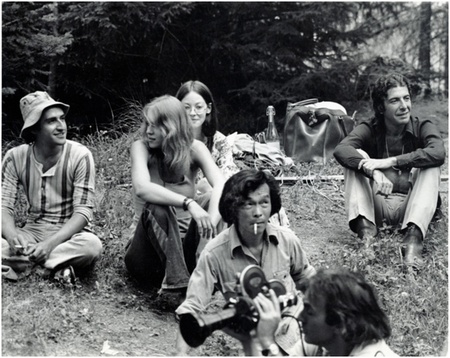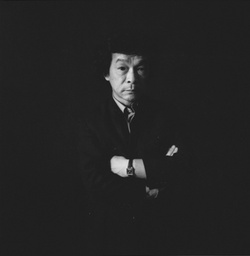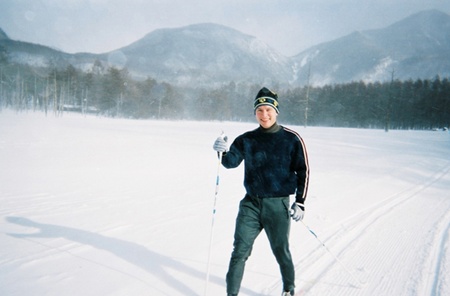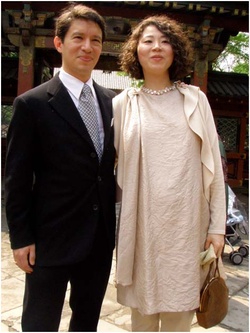When I reflect on why I have been involved as a writer with the Japanese Canadian community for almost 25 years now, I really have the late, great filmmaker and writer Jesse Hideo Nishihata to thank for much of this.
It was more than 20 years ago when I rolled into Toronto in my camper van and met Jesse who was the editor of the Nikkei Voice newspaper that was born out of the 1988 Redress victory. This was when the NV office was located in an old house on Harbord Street. He was positively effusive and embraced me as a comrade from that first day onward in the early 1990s. Interned at Tashme, BC prison camp along with artist Kazuo Nakamura, Jesse had an illustrious career as a National Film Board of Canada documentary filmmaker. He passed away in 2006 at age 77.
Back in those BC days, just before I went to Japan and started to report on my experiences from there in a monthly column for the Nikkei Voice, I would send long handwritten pieces by ‘snail mail’ to Jesse which he would dutifully typeset for publication.
On yearly return trips, I recall his old creaky wooden floor apartment in an old multiplex brick home in the Annex area that was filled with great big books. His get-togethers always had the feeling of celebration to them.
It was after returning back from Japan that his son Junji, 44, and I finally got back in touch over the internet with one another. I would have the pleasure of meeting Junji at some of these gatherings. He went to Japan in 2000 and returned to Canada in 2013.
First of all, I have to say that I really miss your father, Jesse. For readers, can you give us a short description of who he was, his work in the Nikkei community and how you want him to be remembered?
Jesse was an absolute pioneer not only in the Nikkei community, but within the broader Canadian context. He was an award-winning filmmaker, the first editor of the Nikkei Voice and a teacher to hundreds of film and media students. His work as a documentary film producer brought the Japanese-Canadian internment story into Canadian homes as early as 1974 when he made Watari Dori: A Bird of Passage for the CBC. It played on prime time television to an audience of millions, at a time when not many people had ever even heard about what had happened in B.C. during WWII. He later went on to make The Inquiry Film which documented the hearings held by Chief Justice Thomas Berger into a proposed pipeline project in the Mackenzie River Valley in 1977. As he did for the Nikkei community, Jesse put Native issues into the forefront of the national consciousness.
I want Jesse to be remembered for this work, for his way of bringing to light stories that would go ignored by mainstream media – whether he was directly involved in the story or not. Jesse was a profound humanist and was not overly interested in categories and definitions as they applied to people. He saw people for who they were and always found a way to connect with them and to help them connect with each other.

What impact did he have on your career as a writer? What kind of writing are you doing?
I wish I could say I have a career as a writer – I dabble in a number of things, and writing is only a part of it. My long goal of becoming a novelist has not been realized. I suppose the impact he had was to plant this seed in my mind over the years. Certainly his relentless curiosity in all types of literature was a major inspiration for me. You could talk to him about virtually any writer and he would have read him or her, and deeply. As for the writing I am doing these days, while I very occasionally jot things down in my journal, mostly I write emails. I also do some commercial corporate writing, and I am fortunate to work with interesting clients in the film distribution business as well as solar energy, so I feel like I am supporting worthwhile activities. But I have not summitted the mountain I had long ago envisioned.
You went to Japan to work. Can you explain a little about why you went in the first place?
I lived in Japan for over 12 years. Through my youth and early adult years, I resisted the idea of ever going. I suppose I was afraid of what I would find, and I had built up negative stereotypes of crowds and insane work hours. At one point, I was dating a girl who had suggested going to Japan simply as a holiday. While that relationship did not last, her idea stuck with me – why not just go see?
Any particular reason about why you settled in Montreal and not Toronto where you grew up? Jesse settled in Montreal after WW2, didn’t he? How well integrated into that culture was he?
One other reason for us to settle in Montreal is that as you point out, Jesse had lived there as well. In fact my family was based here for some time following the expulsion from the west coast. They arrived in 1948 and my grandmother stayed until 1978. They had a house on Hingston, which is where I live now. I think in the days when they moved there, the bilingual question in Montreal was not as it is now. English was the working language, and you could do well enough using only that side of the coin. So Jesse never really learned French, and living in NDG (Notre-Dame de Grace), there was no impetus to.
What is your own connection with Montreal? Are you bilingual English-French?
Even today, it is still quite Anglophone. As for myself, I had lived in Montreal for a couple years, and also lived in France before that, so I am comfortable with my level of French. Having said that, it is clear that there is a glass ceiling in place, and I feel that the politics strongly favour so-called ‘pur laine Quebeckers’ over other nationalities. For the time being, we have a nice enough lifestyle, but the long term is uncertain. As for Toronto, I am amazed at how much the city has changed over the years. While there are many obvious reasons to live there, I find it just way too expensive overall. It has become much too big city for me. After Tokyo, we were looking to slow things down. Toronto has become the world-class place it always wanted to be, and I find it has paid a high price in livability to attain this coveted status.
How do you self-describe your own Nikkei identity whenever you are asked? Is it more complex because you are living in Montreal?
Actually, it is a bit the opposite, since Montreal is a city with a bilingual, dual-cultural heritage ever since its beginning. So there is an acceptance of the idea that one entity, be it a person or a place, can have multiple roots. I certainly found explaining my background much more difficult in Japan, where people had a hard time believing such a thing existed. I found this to be intensely frustrating and it certainly was a clear dividing line in terms of the people I socialized with.
Can you talk a bit about the JC group that you are heading in Montreal?
The Montreal Japanese-Canadian Cultural Centre has a long history, but membership is declining.
What kind of membership do you have?
We have just under 200 paying members. This includes both pre-war and post-war immigrants and their descendants, but mostly, it is composed of Niseis who settled in the area following internment.
What is the mix of numbers between Ijusha and Nikkei?
I don’t have an exact figure, but I would say it is split about 70-30 between Canadian-born and Japanese immigrants. The real issue is that the membership is declining as Montreal itself CNS: declines. People move away to opportunities in Toronto, or they get tired of the threat of separation. Having said that, we hold a Matsuri every summer that attracts 7,000 visitors (mostly Caucasian francophones), and in all, I have been told by the Japanese consulate that there are around 3,000 Japanese in the Montreal area. So there is plenty of upside to the centre in terms of potential members.
Do you have any personal hopes and wishes for the national Nikkei community? Do you have a personal vision for the national Nikkei community?
My wish for the national Nikkei community was that it mobilize and become more active as a leading force in the fight against injustice. I get a real feeling that after Redress, everyone said ‘well we got ours back, now that’s all done,’ and I think it sends a pretty self-satisfied image to other Canadians.
I tried to revive the local chapter of the NAJC (it has been dormant for 15 years) in the early days of the provincial election campaign, where the Quebec government was tabling legislation to make it illegal for government employees to wear ‘hijabs’. This kind of persecution does not sit well with me, and I found many others who agreed.
But getting people to act on the issue was another matter. Japanese in general are very weak at politics and also at universalizing experiences – there is always the notion of exceptionalism, and I can see it behind the apathy of Japanese-Canadians. So there is lots to do, whether it is in social media or other specific web tools, but more to your point, there is no national vision that I can see. On the other hand, I admit to my limitations.
I am not a natural politician, and although I can occasionally give a nice speech, I am not sure how committed I am to such a project. It is a huge undertaking and I am very much focused on my family for now.
Do you think that JCs who haven’t been to Japan really ‘get’ Japan?
This is a sensitive question that I am grappling with. My sense is basically, that no, most JCs don’t really understand Japan, even though they might partake in certain facets of the culture – say martial arts or music, etc. Of course, Japan itself has evolved far away from the culture that the Isseis brought with them, so it is debatable if it was ever possible in the first place. But there is a disconnect between the reality and the reconstructed image that many JCs are trying to maintain.
Does it matter in the scheme of our evolving identity that they do?
Whether or not this is important I cannot say – on some levels it seems wrong or
misguided, but in other aspects it is also harmless and even positive.
What is the rest of the Nishihata family doing now?
Most of my family is in Toronto, but the last of my father’s siblings is living in Burnaby, right next door to the Nikkei Centre as a matter of fact. My sister is in London UK, where I also have a number of cousins. Everyone is doing well, but in terms of Nikkei issues, I would say I am the only one engaged with the topic at this level. Few of my cousins speak Japanese or have been to Japan, and there is little interest in the history or culture. My immediate siblings however, have been to Japan many times – my sister lived there for several years and she, and my elder brother, both married Japanese nationals, as did I. So there is a variation in our branch of the family you might say.
© 2014 Norm Ibuki









